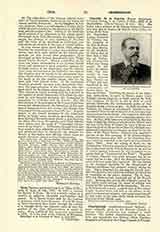

Chorepiscopi (Greek: chorepiskopoi=rural bishops), a name originally given in the Eastern Church. to bishops whose jurisdiction was confined to rural distriets. The earliest ehorepiseopus of whom we have any knowledge was Zoticus, whom Eusebius designates as bishop of the village Cumana in Phrygia in the latter half of the second century. In the beginning the chorepiscopi seem to have exercised all episcopal functions in their rural districts, but from the second half of the third century they were subject to the city bishops. The thirteenth canon of the Synod of Ancyra (314) and the tenth canon of the Synod of Antioch (341) forbade them to ordain deacons or priests without the written permission of the bishop; the sixth canon of the Synod of Sardica (343) decreed that no chorepiscopus should be consecrated where a priest would suffice; and the fifty-seventh canon of the Synod of Laodicea (380) prescribed that the chorepiscopi should be replaced by AepLoSevrat, i.e. priests who have no fixed residence and act as organs of the city bishops. Thus the chorepiscopi in the Eastern Church gradually disappeared. The Second Council of Nicaea (787) is the last to make mention of them. Among the Nestorians they existed till the thirteenth century, and they still exist among the Maronites and Jacobites. In the Western Church they are of rare occurrence before the seventh century, and, as a rule, have no fixed territory or see, being mere assistants of the bishops. Their ever-increasing influence during the Carlovingian period led to repeated synodical legislations against them (Synods of Paris in 829, Aachen in 836, Meaux in 845), so that despite such able defenders of their cause as Rabanus Maurus (“De chorepiscopis”, in P.L., CX., 1195-1206) they gradually disappeared in the tenth and eleventh centuries, and were replaced by the archdeacons.
MICHAEL OTT

